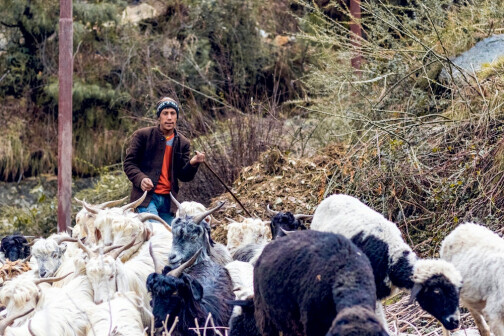Sheep and Goats
For Sunday, 22 November 2020: Matthew 25:31-46
[Jesus said to his followers]: 31 “When the Son of Man comes in his glory, and all the angels with him, then he will sit on the throne of his glory. 32 All the nations will be gathered before him, and he will separate people one from another as a shepherd separates the sheep from the goats, 33 and he will put the sheep at his right hand and the goats at the left. 34 Then the king will say to those at his right hand, ‘Come, you that are blessed by my Father, inherit the kingdom prepared for you from the foundation of the world; 35 for I was hungry and you gave me food, I was thirsty and you gave me something to drink, I was a stranger and you welcomed me, 36 I was naked and you gave me clothing, I was sick and you took care of me, I was in prison and you visited me.’ 37 Then the righteous will answer him, ‘Lord, when was it that we saw you hungry and gave you food, or thirsty and gave you something to drink? 38 And when was it that we saw you a stranger and welcomed you, or naked and gave you clothing? 39 And when was it that we saw you sick or in prison and visited you?’ 40 And the king will answer them, ‘Truly I tell you, just as you did it to one of the least of these who are members of my family, you did it to me.’ 41 Then he will say to those at his left hand, ‘You that are accursed, depart from me into the eternal fire prepared for the devil and his angels; 42 for I was hungry and you gave me no food, I was thirsty and you gave me nothing to drink, 43 I was a stranger and you did not welcome me, naked and you did not give me clothing, sick and in prison and you did not visit me.’ 44 Then they also will answer, ‘Lord, when was it that we saw you hungry or thirsty or a stranger or naked or sick or in prison, and did not take care of you?’ 45 Then he will answer them, ‘Truly I tell you, just as you did not do it to one of the least of these, you did not do it to me.’ 46 And these will go away into eternal punishment, but the righteous into eternal life.”

I have a Navajo friend who inherited from her family the honor of overseeing their traditional sheep camp. On a visit to this site in a remote part of New Mexico one time, she gave me a tour and shared some of the wisdom of her Diné people. Sheep have long been an important part of their culture, not only providing food and wool for weaving, but also spiritual lessons of humility, gratitude, and generosity.
At the sheep camp were also some goats. Curious, I asked my friend about the difference between sheep and goats. She responded that the goats also teach lessons to people, but they were more about what not to do or be: mischievous, rebellious, a wanderer. She observed that while the sheep generally stayed together with the flock, the goats tended to roam about independently, increasing their chances of getting into trouble or danger. She also added that sheep were hardier in their environment thanks to their wool and thick skin, while the goats were more thin-skinned and vulnerable to the cold.
Sheep and goats are important creatures in the pages of the Bible as well. Both animals were used in the sacrificial system of worship by the Jewish people in the Hebrew Scriptures. For example, on the Day of Atonement, a “scapegoat” was driven away from the community into the wilderness, ritually bearing the sins and iniquities of the people (Leviticus 16:21-22). A “paschal lamb” was part of the annual observance of Passover, the remembrance of God’s deliverance of the Hebrew people from slavery to freedom (Exodus 12:1-8). In the New Testament, Jesus himself is identified as “the lamb of God who takes away the sin of the world” (John 1:29).
In today’s Gospel reading, Jesus uses a story about sheep and goats to teach his followers. He tells us that one a day an accounting of what we did or did not do must be made by all the nations of the world, all the peoples of the earth. His reference to “the least of these who are members of my family” is a reminder that just as the Creator sent Jesus on a mission, Jesus now sends his followers through the ages to continue that work: “Whoever receives one whom I send receives me; and whoever receives me receives [the One] who sent me” (John 13:20).
In short, we will be judged by how we treated those whom Jesus sends and the message they carry. Do we treat them with mercy, kindness, and compassion or with cruelty, hostility, and indifference? Have we accepted or rejected the tidings they shoulder, which is tantamount to receiving or refusing Jesus himself? Jesus is clear here. I believe his desire is for all people to be sheep, rather than goats, for it is the sheep who will hear the words, “Come, you that are blessed by my Father, inherit the kingdom prepared for you from the foundation of the world.” If a species transformation is necessary, it can begin today.

